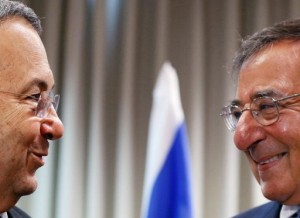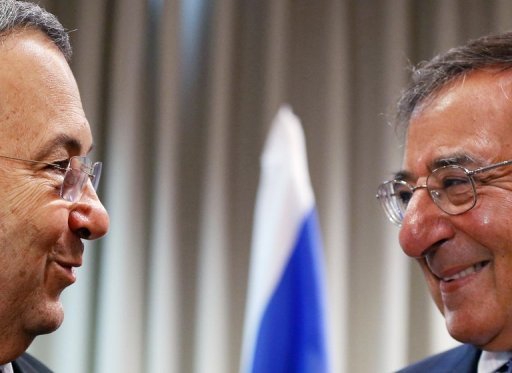AFP -�A high-volume public debate in Israel over a possible imminent military strike on Iran's nuclear facilities is designed to pressure Washington to back its ally more firmly, experts say.

Media chatter over Israel's intentions has become a cacophony, fed daily by pronouncements from politicians, retired generals, former security officials and various commentators.
They fill newspaper columns and radio and TV broadcasts with their opinions for or against a pre-emptive Israeli operation against Iran, with or without US approval or assistance.
Such talk has been further fuelled by the mass distribution of gas masks to the public, by tests of an SMS attack warning system and by speculation about possible Israeli casualty numbers in the event of an Iranian counter-attack.
Defence Minister Ehud Barak and other senior officials have estimated a conflict could last 30 days and claim 500 Israeli lives.
"There is an orchestrated hysteria, deliberately timed, to put the country in a state of anxiety, artificial or not," former military intelligence chief Uri Saguy wrote this weekend in the left-leaning Haaretz newspaper.
Apart from preparing public opinion for the consequences of a conflict, the surge in public statements aims to push US President Barack Obama to take a more hawkish stance on Iran, said Denis Charbit, professor of political science at Israel's Open University.
"The use of this public diplomacy on the part of Prime Minister Benjamin Netanyahu and his defence minister aims to obtain a clearer commitment by the United States to attack if Iran continues its nuclear programme, or at least to give Israel the green light to do so," he told AFP.
Obama has said Washington will stop Iran from acquiring nuclear weapons, but has spoken of military action as a last resort that should be preceded by diplomacy and economic sanctions. Netanyahu on the other hand has aggressively pushed the idea of a pre-emptive strike.
There is concern in Washington that a unilateral Israeli strike may not destroy Iran's underground nuclear facilities and could spark Iranian retaliation worldwide, dragging the United States into another war in the Middle East.
"Statements from the White House are considered too vague by Israeli leaders," Charbit said. "By publicly raising the possibility of an imminent Israeli military operation, they want to push the Americans into showing their hand."
The Israeli wish for a firmer US commitment was expressed by another former head of military intelligence, Amos Yadlin, in an opinion piece published at the weekend in the Washington Post.
"The US president should visit Israel and tell its leadership -- and, more important, its people -- that preventing a nuclear Iran is a US interest, and if we have to resort to military action, we will," he wrote, suggesting that Obama address Israel's parliament.
"This message, delivered by the president of the United States to the Israeli Knesset, would be far more effective than US officials' attempts to convey the same sentiment behind closed doors," said Yadlin, who is in regular contact with Netanyahu and senior Israeli defence and security officials.
But Eytan Gilboa, an expert on US-Israel relations at Bar-Ilan University near Tel Aviv, warned that the Israeli strategy of putting pressure on the White House could be counter-productive, especially with Obama up for re-election in November.
"The period before the presidential election in the United States is inopportune," he said.
"The series of leaks and declarations in the Israeli media has a negative impact by exposing a high level of mutual mistrust and a lack of coordination between Israel and the United States."
Gilboa was however cautiously optimistic about a possible Netanyahu-Obama meeting on the sidelines of next month's UN General Assembly in New York, although Netanyahu's office has so far not confirmed he will attend.
"The meeting might provide a good opportunity to restore trust and understanding between the two leaders regarding the policy towards Iran," he said.
The Iran Project is not responsible for the content of quoted articles.











